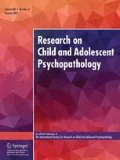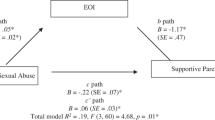Abstract
Earlier research suggests that the natural verbal discourse of mothers with their children can be important in clarifying, verifying, and evaluating the behavior in which a child is engaged, in attributing qualities to the child, and in influencing the child's self-perceptions. We investigated the potential influences of parental affective illness (bipolar affective disorder and unipolar depression in contrast to no history of psychiatric illness) on such “labeling” behavior in a sample of 61 mothers and their older (school-age) and younger (preschool-age) children. It was hypothesized that the dispositions characterizing affective illness (specifically, negativity and disengagement) would be reflected in the labeling statements of mothers with a diagnosis as they interacted with their children. Based on videotaped interactions during a visit to a home-like laboratory apartment, labeling statements were identified in terms of speaker and person being labeled (“addressee”) and coded (positive, negative, mixed, or neutral) for judgmental and affective quality of the statement and reaction of the addressee. Data were analyzed (a) by family unit and (b) my mother to child statements. The general pattern of findings indicated, in relative terms, an excess of negativity on the part of family members in the bipolar group and a dearth of negative affect for mothers in the unipolar group. Negativity in the bipolar group appeared to be especially likely when the setting involved mothers and two male children. Additionally, findings are discussed in terms of sex differences in vulnerability to depression.
Similar content being viewed by others
References
Akiskal, H. S., Hirschfeld, R. M. A., & Yerevanian, B. I. (1983). The relationship of personality to affective disorders. A critical review.Archives of General Psychiatry, 40, 801–810.
Beardslee, W. R. (1984). Familial influences in childhood depression.Pediatric Annals, 13, 32–36.
Bemporad, J. R., & Wilson, A. (1978). A developmental approach to depression in childhood and adolescence.Journal of the American Academy of Psychoanalysis, 6, 325–352.
Billings, A. G., & Moos, R. H. (1982). Psychosocial theory and research on depression: An integrative framework and review.Clinical Psychology Review, 2, 213–237.
Billings, A. G., & Moos, R. H. (1983). Comparisons of children of depressed and non-depressed parents: A social-environmental perspective.Journal of Abnormal Child Psychology, 11, 463–486.
Billings, A. G., & Moos, R. H. (1985). Children of parents with unipolar depression: A controlled 1-year follow-up.Journal of Abnormal Child Psychology, 14, 149–166.
Breznitz, Z., & Sherman, T. (1987). Speech patterning of natural discourse of well and depressed mothers and their young children.Child Development, 58, 395–400.
Cassano, G. B., Maggini, C., & Akiskal, H. S. (1983). Short-term, subchronic, and chronic sequelae of affective disorders.Psychiatric Clinics of North America, 6, 55–67.
Cohn, J. F., Campbell, S. B., Matias, R., & Hopkins, J. (1990). Face-to-face interactions of postpartum depressed and nondepressed mother-infant pairs at 2 months.Developmental Psychology, 26, 15–23.
Conners, C. K., Himmelhock, J., Goyette, C. H., Ulrich, R., & Neil, J. F. (1979). Children of parents with affective illness.Journal of the American Academy of Child Psychiatry, 18, 600–607.
Cox, A. D., Puckering, C., Pound, A., & Mills, M. (1987). The impact of maternal depression in young children.Journal of Child Psychology and Psychiatry, 28, 917–928.
Crook, T., Raskin, A., & Eliot, J. (1981). Parent-child relationships and adult depression.Child Development, 52, 950–957.
Cytryn, L., McKnew, D. H., Zahn-Waxler, C., Radke-Yarrow, M., Gaensbauer, T. J., Harmon R. J., & Lamour, M. (1984). A developmental view of affective disturbances in the children of affectively ill parents.American Journal of Psychiatry 141, 219–222.
Davenport, Y. B., Adland, M. L., Gold, P. W., & Goodwin, F. K. (1979). Manic-depressive illness: Psychodynamic features of multigenerational families.American Journal of Orthopsychiatry, 49, 24–35.
Downey, G., & Coyne, J. C. (1990). Children of depressed parents: An integrative review.Psychological Bulletin, 108, 50–76.
Earls, F. (1987). Sex differences in psychiatric disorders: Origins and developmental influences.Psychiatric Developments, 1, 1–23.
Finn, J. D. (1974).A general model for multivariate analysis. New York: Holt, Rinehart, & Winston.
Gaensbauer, T. J., Harmon, R. J., Cytryn, L., & McKnew, D. H. (1984). Social and affective development in infants with a manic-depressive parent.American Journal of Psychiatry, 141, 223–229.
Goodman, S. H., & Brumley, H. E. (1990). Schizophrenic and depressed mothers: Relational deficits in parenting.Developmental Psychology, 26, 31–39.
Hammen, C., Adrian, C., Gordon, D., Burge, D., & Jaenicke, C. (1987). Children of depressed mothers: Maternal strain and symptom predictors of dysfunction.Journal of Abnormal Psychology, 96, 190–198.
Hammen, C., Burge, D., & Stansbury, K. (1990). Relationship of mother and child variables to child outcomes in a high-risk sample: A causal modeling analysis.Developmental Psychology, 1990, 26, 24–30.
Harder, D. W., Kokes, R. F., Fisher, L., & Strauss, J. S. (1980). Child competence and psychiatric risk. IV. Relationships of parent diagnostic classifications and parent psychopathology severity to child functioning.The Journal of Nervous and Mental Disease, 168, 343–347.
Hirsch, B. J., Moos, R. H., & Reischl, T. M. (1985). Psychosocial adjustment of adolescent children of a depressed, arthritic, or normal parent.Journal of Abnormal Psychology, 94, 154–164.
Hobbs, P. (1982). The relative timing of psychiatric disorders in parents and children.British Journal of Psychiatry, 140, 37–43.
Hollingshead, A. B. (1975).Four-factor index of social status. Unpublished working paper. New Haven, CT.
Hyde, J. S. (1984). How large are gender differences in aggression? A developmental metaanalysis.Developmental Psychology, 20, 722–736.
Inoff, G. E., & Halverson, C. F., Jr. (1977). Behavioral disposition of child and caretaker-child interaction.Developmental Psychology, 13, 274–281.
Jaenicke, C., Hammen, C., Zupan, B., Hiroto, D., Gordon, D., Adrian, C., & Burge, D. (1987). Cognitive vulnerability in children at risk for depression.Journal of Abnormal Child Psychology, 15, 559–572.
Keller, M. B., Beardslee, W. R., Dorer, D. J., Lavori, P. W., Samuelson, H., & Klerman, G. R. (1986). Impact of severity and chronicity of parental affective illness on adaptive functioning and psychopathology in children.Archives of General Psychiatry, 43, 930–937.
Kochanska, G., Kuczynski, L., & Maguire, M. (1989). Impact of diagnosed depression and self-reported mood on mothers' control strategies: A longitudinal study.Journal of Abnormal Child Psychology, 17, 493–511.
Kochanska, G., Kuczynski, L., Radke-Yarrow, M., & Welsh, J. D. (1987). Resolutions of control episodes between well and affectively ill mothers and their young children.Journal of Abnormal Child Psychology, 15, 441–456.
Koop, C. B. (1982). Antecedents of self-regulation: A developmental perspective.Developmental Psychology, 18, 199–214.
Kuyler, P. L., Rosenthal, L., Igel, G., Dunner, D. L., & Fieve, R. R. (1980). Psychopathology among children of manic-depressive patients.Biological Psychiatry, 15, 589–597.
Maccoby, E. E. (1990). Gender and relationships: A developmental account.American Psychologist, 45, 513–520.
Maccoby, E. E., & Jacklin, C. N. (1974).The psychology of sex differences. Stanford, CA: Stanford University Press.
Orvaschel, H., Weissman, M. M., & Kidd, K. K. (1980). Children and depression: The children of depressed parents; the childhood of depressed patients; depression in children.Journal of Affective Disorders, 2, 1–16.
Parke, R. D., & Slaby, R. G. (1983). The development of aggression. In E. M. Hetherington (Vol. Ed.),Carmichael's manual of child psychology (4th ed., pp. 548–641). New York: Wiley.
Puig-Antich, J. (1980). Affective disorders in childhood: A review and perspective.Psychiatric Clinics of North America, 3, 403–424.
Radke-Yarrow, M. (1987, June).Attachment in the context of maternal psychopathology. Paper presented at the Conference on Fruits of Attachment Theory: Findings and Applications Across the Life Cycle, London, England.
Radke-Yarrow, M. (1989). Family environments of depressed and well mothers and their children: Issues of research methods. In G. R. Patterson (Ed.),Aggression and depression in family interactions (pp. 169–184). Hillsdale, NJ: Erlbaum.
Radke-Yarrow, M., Belmont, B., Nottelmann, E., & Bottomly, L. (1990). Young children's self-conceptions: Origins in the natural discourse of depressed and normal mothers and their children. In D. Cicchetti & M. Beeghly (Eds.),The self in transition: Infancy to childhood (pp. 345–361). Chicago: The University of Chicago Press.
Radke-Yarrow, M., Cummings, E. M., Kuczynski, L., & Chapman, M. (1985). Patterns of attachment in two- and three-year-olds in normal families and families with parental depression.Child Development, 56, 884–893.
Radke-Yarrow, M., & Kochanska, G. (1989). Anger in young children. In N. L. Stein, B. Leventhal, & T. Trabasso (Eds.),Psychological and biological approaches to emotion (pp. 297–310). Hillsdale, NJ: Erlbaum.
Radke-Yarrow, M., & Sherman, T. (1985). Interaction of cognition and emotions in development. In R. A. Hinde, A. N. Perret-Clermont, & J. Stevenson-Hinde (Eds.),Social relationships and cognitive development (pp. 173–190). Oxford, England: Clarendon Press.
Radloff, L. S., & Rae, D. S. (1979). Susceptibility and precipitating factors in depression: Sex differences and similarities.Journal of Abnormal Psychology, 88, 174–181.
Rutter, M. (1990). Commentary: Some focus and process considerations regarding effects of parental depression on children.Developmental Psychology, 26, 60–67.
Rutter, M., Izard, C. E., & Read, P. B. (Eds.) (1986).Depression in young people: Developmental and clinical perspectives. New York: Guilford Press.
Rutter, M., & Quinton, D. (1984). Parental psychiatric disorder: Effects on children.Psychological Medicine, 14, 853–880.
Spitzer, R. L., & Endicott, J. (1977). The Schedule for Affective Disorders and Schizophrenia: Lifetime Version. New York: New York State Psychiatric Institute.
Tieger, T. (1980). On the biological basis of sex differences in aggression.Child Development, 51, 943–963.
Weissman, M. M., & Klerman, G. L. (1977). Sex differences and the epidemiology of depression.Archives of General Psychiatry, 34, 98–111.
Weissman, M. M., & Paykel, E. S. (1974).The depressed woman: A study of social relationships. Chicago: University of Chicago Press.
Weissman, M. M., Paykel, E. S., & Klerman, G. L. (1972). The depressed woman as a mother.Social Psychiatry, 7, 98–108.
Wells, V. E., Deykin, E. Y., & Klerman, G. L. (1985). Risk factors for depression in adolescence.Psychiatric Developments, 3, 83–108.
Wylie, R. C. (1987). Mothers' attributions to their children. In T. Honess & K. Yardley (Eds.),Self and identity: Perspectives across the lifespan (pp. 79–92). London: Routledge & Kegan Paul.
Wylie, R. C. (1990). Mothers' attributions to their young children: The verbal environment as a source of children's self-concept acquisition.Journal of Personality, 58, 419–441.
Zahn-Waxler, C., Cummings, E. M., McKnew, D. H., & Radke-Yarrow, M. (1984). Altruism, aggression, and social interactions in young children with a manic-depressive parent.Child Development, 55, 112–122.
Author information
Authors and Affiliations
Additional information
This work was supported by the National Institute of Mental Health, Bethesda, Maryland, and by the John D. and Catherine T. MacArthur Foundation Research Network on Transition from Infancy to Early Childhood. Appreciation is extended to Nancy Lemos and Marcella Maguire for coding the data. National Institute of Mental Health, Building 15K, 9000 Rockville Pike, Bethesda, Maryland 20892.
Rights and permissions
About this article
Cite this article
Inoff-Germain, G., Nottelmann, E.D. & Radke-Yarrow, M. Evaluative communications between affectively Ill and well mothers and their children. J Abnorm Child Psychol 20, 189–212 (1992). https://doi.org/10.1007/BF00916548
Revised:
Issue Date:
DOI: https://doi.org/10.1007/BF00916548




